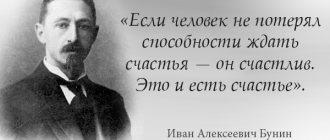✍ Examples
Vitaly Pukhanov
“Fruits of the Sap Tree” (2003):
There was darkness and pitch-black light.
Another world converged with the world.
And I said: Yes, of course,
Nothing is eternal under the Moon,
Stephen King
“The Green Mile” (1996), translation - Victor Weber, Dmitry Weber, Preface-letter October 27, 1995:
“... what will happen if we resume publishing a large novel in separate brochures these days? Everyone, of course, knew that this had already happened ( nothing new under the sun ) at least twice.”
Erich Maria Remarque (1898 – 1970)
"Shadows in Paradise" (published 1971):
" Nothing lasts forever under the sun , and the beauty will become Satan"
Zoshchenko Mikhail Mikhailovich (1895 – 1958)
"In a Hundred Years" (1925):
“They say: nothing lasts forever under the moon
. They're obviously lying. The complaints department will be there forever.”
Repin Ilya Efimovich (1844 – 1930)
“Far and Close” (VI Artel), about the collapse of the artel of artists:
“ But nothing lasts forever under the sun! .. And good things pass especially soon... And some misunderstandings began in Artel.”
Belinsky Vissarion Grigorievich (1811 – 1848)
Works by Konstantin Masalsky:
“It’s a long-known truth: nothing is new under the sun.
- nothing is more confirmed than how old people grow up praising everything old and scolding everything new.”
Lenin Vladimir Ilyich (1870 – 1924)
European capital and autocracy, Complete works, vol. 9, p. 372:
“... the French bourgeoisie lent the autocratic government a small sum of billions of ten francs (up to 4,000 million rubles). But... nothing lasts forever under the sun!
The war with Japan, having exposed all the rottenness of the autocracy, finally undermined its credit even with the “friendly and allied” French bourgeoisie.”
Saltykov-Shchedrin Mikhail Evgrafovich (1826 – 1889)
“Faithful Trezor” (1885):
“Nevertheless, the merchant Vorotilov was right in asserting that nothing under the moon lasts forever
. One morning, Vorotilov’s clerk, walking past the dog’s kennel into the barn, found Trezorka sleeping. This has never happened to him."
Leskov Nikolay Semyonovich (1831 – 1895)
"Bypassed" 3, 10:
“ Nothing, my friend, lasts forever under the moon ,” the lanky sheikh impressively tells Dolinsky...”
Pisemsky Alexey Feofilaktovich (1821 – 1881)
"Bourgeois" 2, 7:
“But you, however, have changed a lot... you've turned completely grey... you've lost weight. “Everything changes in nature: this is its law!” — said Begushev.”
Hugo Victor Marie (1802 – 1885)
“Les Miserables” (1862), translated by A. K. Vinogradov (1888 - 1946), chapter 8, book 3, part 1:
"Alas! Everything is old and there is nothing new under the sun . There is nothing left unpublished from the works of the Creator! “ There is nothing new under the sun ,” said Solomon. “Everyone has the same love,” says Virgil.”
* a famous, repeated phrase in the book of Ecclesiastes of the Old Testament, the authorship of which is attributed to Solomon.
Pushkin, Alexander Sergeyevich (1799 – 1837)
The poem “Mustache” (1816) is dedicated to the perishability of life. It contains the phrase:
"Hussar! everything is perishable under the moon ."
“Nothing lasts forever under the sun” - the meaning and origin of the phraseological unit?
History of the origin of phraseological units
If we consider this expression in this form, then the age of this phraseological unit is not very long.
But if we judge the meaning that this idiom carries and its different variations in different languages, then history takes us to a time that dates back centuries BC. The first analogue of this phrase can be traced in the so-called Book of Ecclesiastes, which is, as it were, one of the constituent parts of the Bible. It is not known for certain who Ecclesiastes was, but this book is also called the Book of the Preacher or the Book of Solomon. That is, it is assumed that the name Ecclesiastes refers to King Solomon. In the first verse of this book, the author, by Solomon's assumption, calls himself Ecclesiastes, which in Latin means a person “who calls an assembly.” There are a lot of statements in this book that over time have turned into phraseological units and set expressions. The expression “nothing lasts forever under the sun” in the book of Ecclesiastes looks like this:
What has been is what will be; and what has been done will be done, and there is nothing new under the sun.
As we can see, it is quite similar, but the words are slightly different.
Further, this expression can be found in many literary works and in different languages, in one form or another.
So in the English language this phraseological unit also exists, but it sounds slightly different. Nothing new under the sun. This translates to “there is nothing new under the sun.”
In Latin, this idiom looks like this: Nil novi sub luna. Here we can hear a mention of the moon, that is, an option closer to the one to which we are accustomed. There is nothing new under the sun – that’s how it translates.
In Russian, these lines can be found for the first time in a poem by the great Russian poet Karamzin.
“Nothing is new under the sun: What is, that was, will forever be. And before, blood flowed like a river, And before, man cried, And before, he was a victim of fate, Hope, weakness, vice.”
At the same time, the title of the work sounds like this: “The Experienced Wisdom of Solomon, or Selected Thoughts from Ecclesiastes.” Karamzin immediately makes it clear where he borrowed these lines from. The poem was written in 1797.
After Karamzin, we can find these lines in many classics of Russian literature. This
- Pushkin,
- Saltykov-Shchedrin,
- Leskov.
And even in Lenin’s work “European Capital and Autocracy”, one can read this thoughtful phraseological unit in exactly the form to which we are accustomed: “nothing lasts forever under the sun.”
Expression value
The meaning of the idiom is deeply philosophical. One might argue how nothing lasts forever when, for example, the famous Egyptian pyramids stand for so long.
Yes, if we take human life as a point of reference, then in comparison the pyramids are indeed eternal. But if you take the life of a planet or solar system, then how long the pyramids lasted is just an instant.
Although the meaning that was in this expression initially, I mean the expression from the book of Ecclesiastes, is somewhat different from the one to which we are accustomed. After all, the fact that nothing is new, on the contrary, speaks of the eternity of what happens in the universe. Everything that happens has already happened and is repeated again.
Similar questions:
- What does the expression “knuckle down” mean?
- “How do chickens get into cabbage soup” - the meaning and origin of phraseological units with examples?
With similar meaning
Everything passes
Inscription on the ring of King Solomon (10th century BC).
Everything flows, everything changes
The main idea of the teachings of the ancient Greek philosopher Heraclitus from Ephesus (c. 554 - 483 BC), which means the variability of everything.
We don't notice how everything changes
Quote from the novel “Roadside Picnic” (1972) by the Strugatsky brothers (Arkady Natanovich Strugatsky (1925 - 1991), Boris Natanovich Strugatsky (1933 - 2012)), words by Noonan.
You can't step into the same river twice
Words of the ancient Greek philosopher Heraclitus of Ephesus (c. 554 - 483 BC).
This is how worldly glory passes (Sic transit gloria mundi)
An old proverb from a quote from the book of the German mystic philosopher Thomas a à Kempis (XV century) “On the Imitation of Christ” (I, 3, 6).










